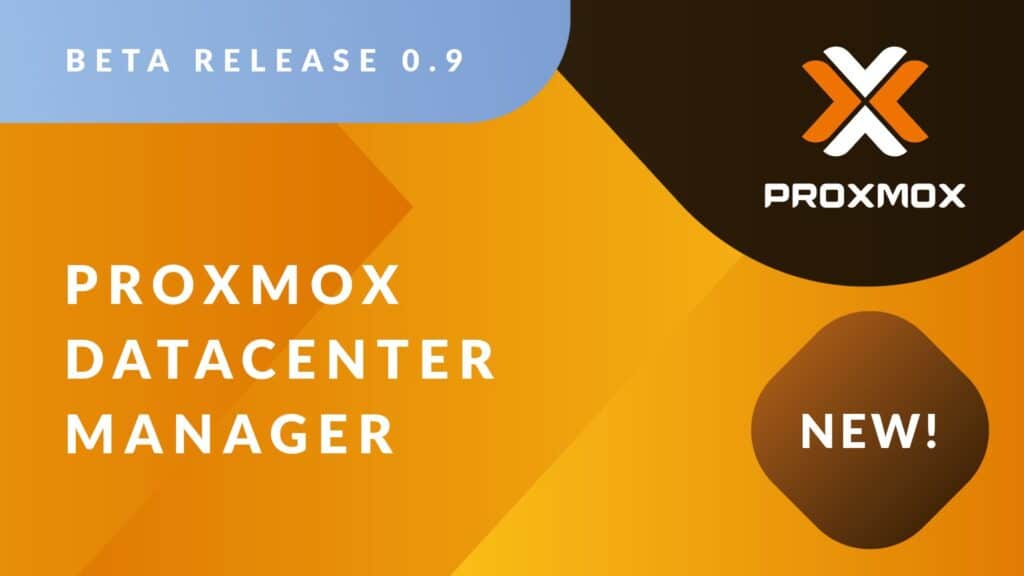1. What is Proxmox Datacenter Manager?
Proxmox Datacenter Manager (PDM) is a brand-new centralized management tool from Proxmox, designed to give sysadmins a “single pane of glass” view across all nodes and clusters.
The goal is to simplify multi-cluster management and provide cross-platform oversight for Proxmox VE, Proxmox Backup Server, and potentially other Proxmox products in the future.
👉 PDM is built entirely in Rust (backend + CLI) and features a modern web frontend using Proxmox’s new widget toolkit, offering faster performance, accessibility improvements, and compatibility across environments.
2. Key Objectives
- Centralize monitoring and basic management of nodes and clusters.
- Enable VM migration across clusters, even without cluster network membership.
- Provide SDN capabilities (EVPN/VXLAN) via a unified interface.
- Integrate with other Proxmox projects (PBS, PMG, Offline Mirror) over time.
- Scale for large deployments (tested with 5,000+ remotes and 10,000+ guests).
3. What’s New in 0.9 Beta
The 0.9 Beta release introduces:
- EVPN configuration for SDN: Build VXLAN/BGP-EVPN overlays across clusters.
- Improved search: Faster resource discovery.
- Optimized metric collection: More efficient and less resource-hungry.
- Privilege management: Role-based access control from the web UI.
- Upgrade path from Alpha: Seamless upgrade from earlier PDM versions.
- Debian 13 “Trixie” base with Linux Kernel 6.14.11 and ZFS 2.3.4.
4. Minimum Requirements
- OS: Debian 13 (x86-64/AMD64).
- CPU: 2 vCPUs (4+ recommended for larger setups).
- RAM: 4 GB minimum (8–16 GB recommended).
- Disk: 20 GB free.
- Network: Direct connectivity to PVE nodes/clusters (no reverse proxy support yet).
5. Installation on Debian 13
5.1 Update System
sudo apt update && sudo apt -y full-upgrade
sudo reboot
5.2 Add Repository
echo "deb http://download.proxmox.com/debian/pdm pdm-test main" | sudo tee /etc/apt/sources.list.d/pdm.list
wget -qO- https://enterprise.proxmox.com/debian/proxmox-release-pdm.gpg | sudo tee /etc/apt/trusted.gpg.d/proxmox-release-pdm.gpg > /dev/null
sudo apt update
Code language: PHP (php)5.3 Install PDM
sudo apt install -y proxmox-datacenter-manager
5.4 Enable Services
sudo systemctl enable --now pdm-api
sudo systemctl enable --now pdm-web
5.5 Access Web UI
http://<SERVER_IP>:8080
Code language: HTML, XML (xml)Default user: admin (reset with pdm-cli user passwd admin if needed).
6. Initial Configuration
- Log into the dashboard.
- Navigate to Remotes → Add.
- Add your Proxmox VE nodes or clusters with API credentials.
- The dashboard will populate with nodes, VMs, and resources.
7. Advanced Features
🔸 EVPN (SDN across clusters)
Configure BGP-EVPN overlays between clusters from a single interface.
CLI example:
pdm-cli network evpn add --name evpn-lab --asn 65001 --peers 192.168.100.1
Code language: CSS (css)🔸 Metrics and Monitoring
- Optimized real-time data collection.
- Scales to thousands of remotes.
- Fully integrated into the new Proxmox UI framework.
🔸 User and Privilege Management
- Create roles with limited permissions.
- Assign fine-grained access at cluster or node level.
🔸 Cross-Cluster VM Migration
Move VMs between clusters even if they’re not in the same PVE cluster network, as long as centralized storage is available.
8. Roadmap & Current Limitations
🔹 Current limitations (Beta 0.9):
- Requires Proxmox VE 8+ for integration.
- No reverse proxy support (VPNs like WireGuard/OpenVPN recommended).
- Limited integration with Proxmox Backup Server (PBS) and Mail Gateway (PMG).
🔹 Planned improvements:
- Full PBS integration.
- Future PMG and Offline Mirror support.
- Enhanced multi-cluster HA and reporting features.
- More granular monitoring and alerting dashboards.
9. Automated Install Script
For faster deployment:
#!/bin/bash
# Automated Proxmox Datacenter Manager 0.9 Beta Installer
set -e
echo "== Updating system =="
apt update && apt -y full-upgrade
echo "== Installing dependencies =="
apt install -y curl wget gnupg apt-transport-https ca-certificates
echo "== Adding PDM repo =="
echo "deb http://download.proxmox.com/debian/pdm pdm-test main" > /etc/apt/sources.list.d/pdm.list
wget -qO- https://enterprise.proxmox.com/debian/proxmox-release-pdm.gpg | tee /etc/apt/trusted.gpg.d/proxmox-release-pdm.gpg > /dev/null
apt update
echo "== Installing Proxmox Datacenter Manager =="
apt install -y proxmox-datacenter-manager
echo "== Enabling services =="
systemctl enable --now pdm-api
systemctl enable --now pdm-web
echo "== Done! Access PDM at: http://$(hostname -I | awk '{print $1}'):8080"
Code language: PHP (php)Save as install_pdm.sh, then:
chmod +x install_pdm.sh
sudo ./install_pdm.sh
Conclusion
The release of Proxmox Datacenter Manager 0.9 Beta marks a major milestone for Proxmox. With its Rust-based backend, EVPN SDN, privilege management, optimized metrics, and cross-cluster capabilities, it is shaping up to be the go-to solution for centralized multi-cluster management.
While still in beta, PDM already shows the future of Proxmox: scalable, modern, and unified datacenter oversight. A stable release is expected later in 2025.
Frequently Asked Questions (FAQ)
Q: Can I upgrade from Proxmox Datacenter Manager Alpha?
Yes, there is a documented upgrade path. Use the official guide to migrate from Alpha to Beta.
Q: How many Proxmox VE hosts can I manage with PDM?
In internal tests, PDM handled 5,000+ remotes and 10,000+ virtual guests.
Q: Does PDM replace Proxmox VE’s built-in cluster manager?
No. PDM is a complementary layer designed for multi-cluster management, while PVE’s cluster manager remains the primary tool for intra-cluster operations.
Q: Will Proxmox Backup Server (PBS) and Proxmox Mail Gateway (PMG) be integrated?
Yes, integration with PBS is planned, followed by PMG and Offline Mirror after the first stable release.
Q: Can PDM be installed on the same server as Proxmox VE or PBS?
It’s possible but not recommended for production. Proxmox suggests running PDM on a dedicated Debian 13 host.
Q: What environments are supported?
Any standard x86-64/AMD64 Debian 13 system.
vía: Proxmox Forum

